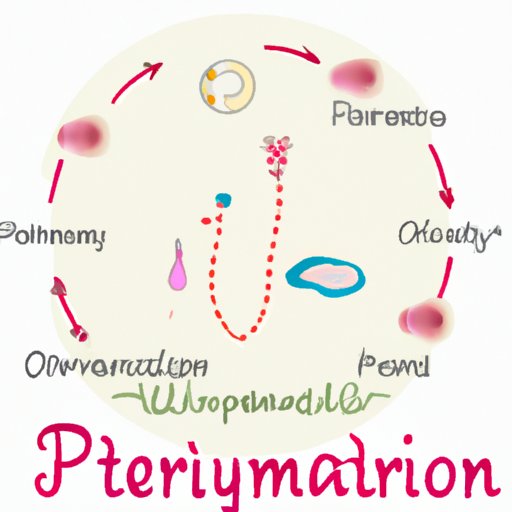Introduction
Pregnancy is a natural process that many couples strive for. Knowing when you are most likely to get pregnant can help you plan for conception and increase your chances of success. In order to understand when you are most likely to conceive, it is important to understand the basics of fertility and how hormones and ovulation play a role.

Identifying Your Most Fertile Time of the Month
Fertility is defined as the ability to become pregnant or father a child. Every woman’s fertility is unique, so it is important to monitor your menstrual cycle and recognize the signs of fertility. Tracking your ovulation is the best way to determine when you are most likely to conceive.
Monitoring your menstrual cycle is the first step in understanding your fertility. The average menstrual cycle lasts 28 days, but this can vary from woman to woman. It is important to note the length of your cycle and any changes that may occur over time.
Understanding the importance of tracking ovulation is key to determining when you are most likely to conceive. Ovulation usually occurs around day 14 of your menstrual cycle, but this can vary depending on the length of your cycle. By tracking your ovulation, you can determine the best time to try to conceive.
Recognizing signs of fertility can also help you determine when you are most likely to get pregnant. Some common signs of fertility include increased vaginal discharge, abdominal bloating, and breast tenderness. Paying attention to these signs and tracking your ovulation can help you identify when you are most fertile.

Exploring the Role of Hormones in Fertility
Hormones play an important role in fertility and ovulation. The main hormones involved in fertility are estrogen, progesterone, luteinizing hormone (LH), and follicle-stimulating hormone (FSH). Estrogen and progesterone are responsible for regulating the menstrual cycle and preparing the uterus for ovulation. LH and FSH are released by the pituitary gland and are responsible for stimulating the ovaries to release an egg.
Hormones affect ovulation in a variety of ways. Estrogen and progesterone work together to prepare the uterus for ovulation. LH and FSH stimulate the ovaries to produce eggs and trigger the release of the egg during ovulation. Imbalances in any of these hormones can affect your ability to conceive.
Understanding the Ovulation Process
Ovulation is the process by which a mature egg is released from the ovary. The menstrual cycle plays an important role in ovulation. During the first half of the cycle, estrogen levels rise and the uterine lining thickens in preparation for ovulation. In the second half of the cycle, progesterone levels rise and trigger the release of an egg. After the egg is released, it travels down the fallopian tube where it can be fertilized by sperm.
The stages of ovulation include the follicular phase, ovulation, and the luteal phase. During the follicular phase, estrogen levels rise and the uterine lining thickens. During ovulation, the egg is released from the ovary. During the luteal phase, progesterone levels rise and the uterine lining prepares for implantation of a fertilized egg.

Calculating the Best Time to Conceive
Calculating the best time to conceive can be done by tracking your ovulation. A calendar can be used to track the length of your menstrual cycle and identify when ovulation is likely to occur. There are also a variety of tools and resources available online that can help you calculate your most fertile time of the month.
Knowing when you are most fertile can help you plan for conception. Generally, ovulation occurs 12 to 16 days before the start of your next period. The most fertile days are the three days leading up to and including the day of ovulation.
Utilizing Apps and Tools to Track Ovulation
There are a variety of apps and tools available to help you track your ovulation. These tools can help you monitor your menstrual cycle and identify when you are most likely to conceive. They can also provide helpful information about your fertility status and help you determine when you should seek help from a fertility specialist.
Using these tools can help you better understand your fertility and make informed decisions about when to try to conceive. They can also help you identify any potential issues that may be affecting your fertility and provide information about treatments that may be available.
Knowing When to Seek Help from a Fertility Specialist
If you have been trying to conceive for more than one year without success, it is recommended that you seek help from a fertility specialist. A fertility specialist can help identify any underlying issues that may be affecting your fertility and recommend treatments that may be beneficial. These treatments can range from medications to assist with ovulation to more advanced treatments such as in vitro fertilization (IVF).
It is important to remember that there are alternatives to traditional treatments. Acupuncture, nutrition, and lifestyle changes can all be beneficial in improving fertility. Seeking out support from a fertility specialist can help you explore all of your options and make an informed decision about the best course of action for you.
Conclusion
Pregnancy is a natural process that many couples strive for. Knowing when you are most likely to get pregnant can help you plan for conception and increase your chances of success. Identifying your most fertile time of the month involves understanding the basics of fertility, exploring the role of hormones in fertility, understanding the ovulation process, calculating the best time to conceive, utilizing apps and tools to track ovulation, and knowing when to seek help from a fertility specialist.
By taking the time to understand your fertility and track your ovulation, you can increase your chances of conceiving. It is important to remember that every woman’s fertility is unique and that seeking help from a fertility specialist is always an option.


